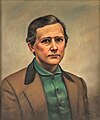
Stephen Foster
Stephen Collins Foster (July 4, 1826 – January 13, 1864), known as "the father of American music", was an American composer known primarily for his parlour and minstrel music during the Romantic period. He wrote more than 200 songs, including "Oh! Susanna", "Hard Times Come Again No More", "Camptown Races", "Old Folks at Home" ("Swanee River"), "My Old Kentucky Home", "Jeanie with the Light Brown Hair", "Old Black Joe", and "Beautiful Dreamer", and many of his compositions remain popular today.
For other uses, see Stephen Foster (disambiguation).
Stephen Foster
January 13, 1864 (aged 37)
- Composer
- lyricist
- poet[1]
1844–1864
Various sheet music publishers and brother, Morrison Foster
- William Barclay Foster (father)
- Eliza Clayland Tomlinson Foster (mother)
- Morrison Foster (brother)
- Evelyn Foster Morneweck (niece)
Statue controversy and later views[edit]
A 1900 statue of Foster by Giuseppe Moretti was located in Schenley Plaza, in Pittsburgh, from 1940 until 2018. On the unanimous recommendation of the Pittsburgh Art Commission, the statue was removed on April 26, 2018.[36] Its new home has not yet been determined. It has a long reputation as the most controversial public art in Pittsburgh "for its depiction of an African-American banjo player at the feet of the seated composer. Critics say the statue glorifies white appropriation of black culture and depicts the vacantly smiling musician in a way that is at best condescending and at worst racist."[37] A city-appointed Task Force on Women in Public Art called for the statue to be replaced with one honoring an African American woman with ties to the Pittsburgh community. The Task Force held a series of community forums in Pittsburgh to collect public feedback on the statue replacement and circulated an online form which allowed the public to vote for one of seven previously selected candidates or write in an alternate suggestion.[38] However, the Task Force on Women in Public Art and the Pittsburgh Art Commission have not reached an agreement as to who will be commemorated or if the statue will stay in the Schenley Plaza location.[39]
The musicologist Ken Emerson has suggested the presence of racism in some of Foster's lyrics.[40]
Music scores


